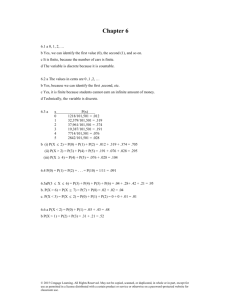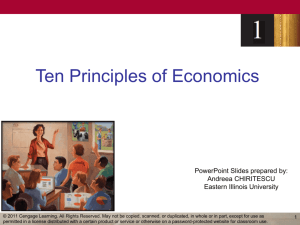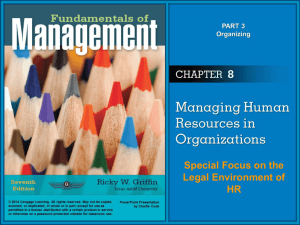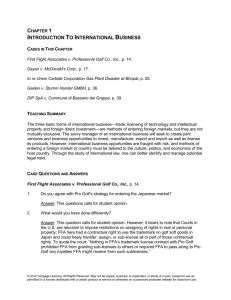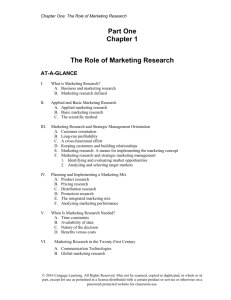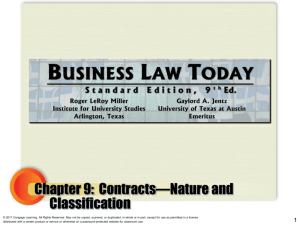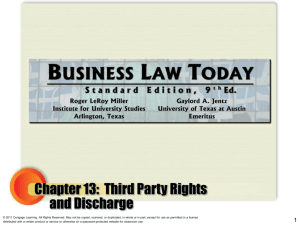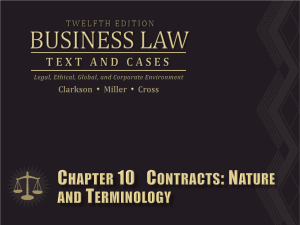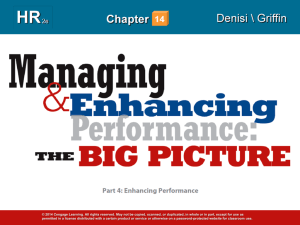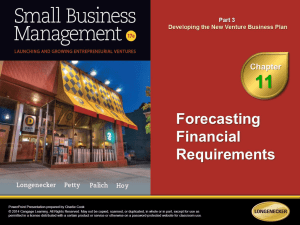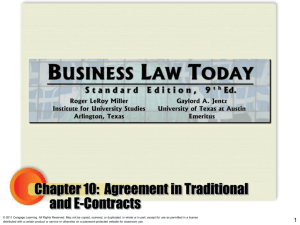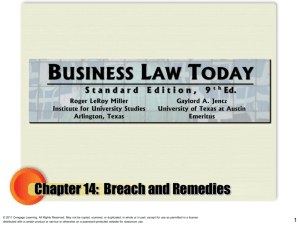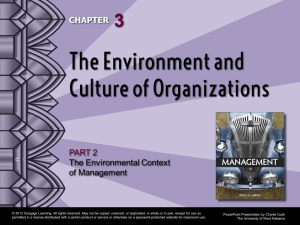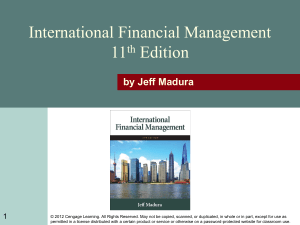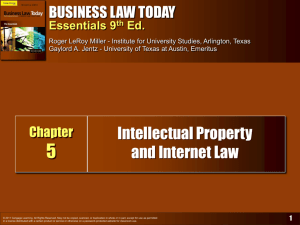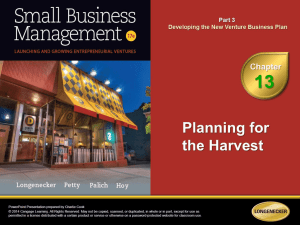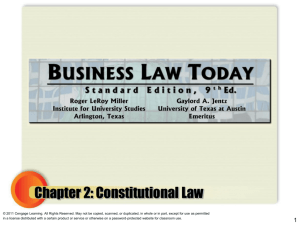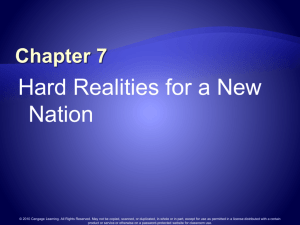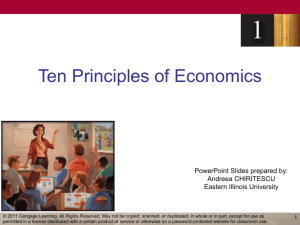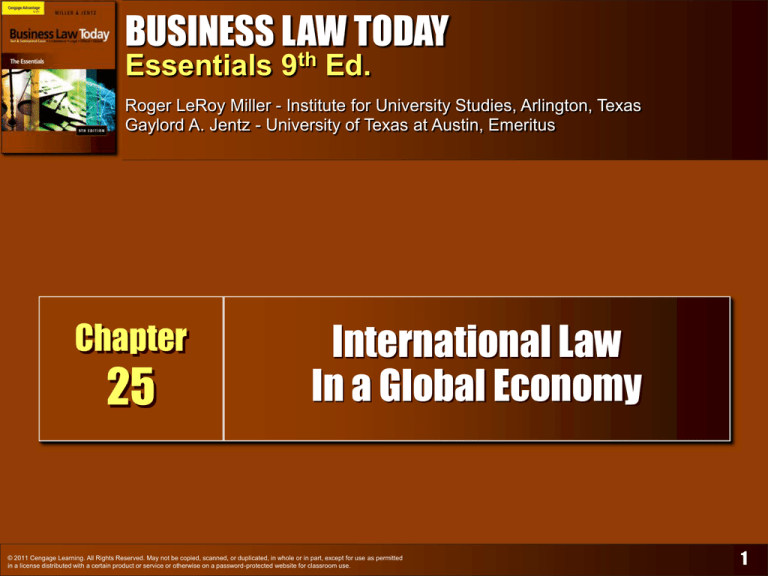
BUSINESS LAW TODAY
Essentials 9th Ed.
Roger LeRoy Miller - Institute for University Studies, Arlington, Texas
Gaylord A. Jentz - University of Texas at Austin, Emeritus
Chapter
25
International Law
In a Global Economy
© 2011 Cengage Learning. All Rights Reserved. May not be copied, scanned, or duplicated, in whole or in part, except for use as permitted
in a license distributed with a certain product or service or otherwise on a password-protected website for classroom use.
1
Learning Objectives
What is the principle of comity and why do
courts deciding disputes involving a
foreign law or judicial decree apply this
principle?
What is the act of state doctrine? In what
circumstances is this doctrine applied?
Under the Foreign Sovereign Immunities
Act of 1976, on what bases might a foreign
state be considered subject to the
jurisdiction of U.S. Courts?
© 2011 Cengage Learning. All Rights Reserved. May not be copied, scanned, or duplicated, in whole or in part, except for use as permitted
in a license distributed with a certain product or service or otherwise on a password-protected website for classroom use.
2
Learning Objectives
In what circumstances will U.S. antitrust
laws be applied extraterritoriality?
Do U.S. laws prohibiting employment
discrimination apply in all circumstances
to U.S. employees working for U.S.
factories abroad?
© 2011 Cengage Learning. All Rights Reserved. May not be copied, scanned, or duplicated, in whole or in part, except for use as permitted
in a license distributed with a certain product or service or otherwise on a password-protected website for classroom use.
3
International Law – Sources and Principles
The most important principles and
doctrines applied in the interest of
maintaining harmonious relations among
nations:
The Principle of Comity.
The Act of State Doctrine.
The Doctrine of Sovereign Immunity.
© 2011 Cengage Learning. All Rights Reserved. May not be copied, scanned, or duplicated, in whole or in part, except for use as permitted
in a license distributed with a certain product or service or otherwise on a password-protected website for classroom use.
4
Sources of International Law
International Customs: “evidence of a
general practice accepted as law.”
Treaties and International Agreements.
International Organizations.
Common Law and Civil Law Systems.
Most of Europe, Latin America, Africa, and
Asia based on civil law systems.
England, U.S. and other ex-British colonies
based on common law.
© 2011 Cengage Learning. All Rights Reserved. May not be copied, scanned, or duplicated, in whole or in part, except for use as permitted
in a license distributed with a certain product or service or otherwise on a password-protected website for classroom use.
5
The Principle of Comity
One nation will
defer and give effect to
the laws and judicial decrees of another
country, as long as those laws and
judicial decrees are consistent with the
law and public policy of the
accommodating nation.
© 2011 Cengage Learning. All Rights Reserved. May not be copied, scanned, or duplicated, in whole or in part, except for use as permitted
in a license distributed with a certain product or service or otherwise on a password-protected website for classroom use.
6
The Act of State Doctrine
Judicial branch of one country will not
examine the validity of public acts
committed by recognized foreign
government within its own territory.
This doctrine is often invoked to protect:
Expropriation, and
Confiscation.
© 2011 Cengage Learning. All Rights Reserved. May not be copied, scanned, or duplicated, in whole or in part, except for use as permitted
in a license distributed with a certain product or service or otherwise on a password-protected website for classroom use.
7
The Doctrine of Sovereign Immunity
This doctrine exempts foreign nations
from jurisdiction in U.S. courts.
The Foreign Sovereign Immunities Act
expanded the jurisdiction of U.S. courts
for creditors of foreign governments.
© 2011 Cengage Learning. All Rights Reserved. May not be copied, scanned, or duplicated, in whole or in part, except for use as permitted
in a license distributed with a certain product or service or otherwise on a password-protected website for classroom use.
8
Doing Business Internationally
Exporting, through:
An Agent.
A Foreign Distributor.
Manufacturing Abroad, through:
Licensing.
Franchising.
Investing in a subsidiary or joint venture.
© 2011 Cengage Learning. All Rights Reserved. May not be copied, scanned, or duplicated, in whole or in part, except for use as permitted
in a license distributed with a certain product or service or otherwise on a password-protected website for classroom use.
9
Regulation of Specific
Business Activities
Nations impose laws and controls to
restrict or facilitate international
business.
Investing.
Export Controls.
Import Controls.
CASE 25.1 Fuji Photo Film Co. v.
International Trade Commission (2007).
Jazz violated the cease and desist order by
selling LFFP’s that were not sold first in the
United States.
© 2011 Cengage Learning. All Rights Reserved. May not be copied, scanned, or duplicated, in whole or in part, except for use as permitted
in a license distributed with a certain product or service or otherwise on a password-protected website for classroom use.
10
Regulation of Specific
Business Activities
Import Controls (cont’d).
Quotas and Tariffs.
CASE 25.2 United States v. Inn Foods, Inc.
(2007). Document satisfied Statute of Frauds,
identified Quality Printing as the customer with
a signed personal guaranty.
Anti-Dumping Duties.
© 2011 Cengage Learning. All Rights Reserved. May not be copied, scanned, or duplicated, in whole or in part, except for use as permitted
in a license distributed with a certain product or service or otherwise on a password-protected website for classroom use.
11
Minimizing Trade Barriers
Most nations are members of the World
Trade Organization and required to grant
“normal trade relations” status to other
members.
European Union.
North American Free Trade Agreement.
Central America-Dominican Republic-USA Free
Trade Agreement (CAFTA-DR).
Bribing Foreign Officials.
© 2011 Cengage Learning. All Rights Reserved. May not be copied, scanned, or duplicated, in whole or in part, except for use as permitted
in a license distributed with a certain product or service or otherwise on a password-protected website for classroom use.
12
Commercial Contracts in
an International Setting
Choice of Language Clause.
Choice of Forum.
Choice of Law .
Force Majeure (impossibility or “act of
God”).
Civil Dispute Resolution.
© 2011 Cengage Learning. All Rights Reserved. May not be copied, scanned, or duplicated, in whole or in part, except for use as permitted
in a license distributed with a certain product or service or otherwise on a password-protected website for classroom use.
13
Payment Methods for
International Transactions
Monetary Systems.
Foreign Exchange Rates/Markets.
Correspondent Banks (affiliated banks in
different countries).
Letters of Credit.
Conditional promise by Issuer (Bank) to pay
Beneficiary (Seller) on behalf of Account
(Buyer).
© 2011 Cengage Learning. All Rights Reserved. May not be copied, scanned, or duplicated, in whole or in part, except for use as permitted
in a license distributed with a certain product or service or otherwise on a password-protected website for classroom use.
14
Letter of
Credit
© 2011 Cengage Learning. All Rights Reserved. May not be copied, scanned, or duplicated, in whole or in part, except for use as permitted
in a license distributed with a certain product or service or otherwise on a password-protected website for classroom use.
15
U.S. Laws in a Global Context
International Tort Claims (Alien Tort
Claims Act):
CASE 25.3 Khulumani v Barclay National
Bank, Ltd. (2007). Alien Tort Claims Act applied
to banks that were “aiding and abetting” human
rights violations in South Africa.
Antidiscrimination Laws: Generally, U.S.
firms must abide by U.S. anti-discrimination
laws, even in their foreign activities, unless
doing so would require them to violate the
laws of the foreign country (the “foreign laws
exception”).
© 2011 Cengage Learning. All Rights Reserved. May not be copied, scanned, or duplicated, in whole or in part, except for use as permitted
in a license distributed with a certain product or service or otherwise on a password-protected website for classroom use.
16

